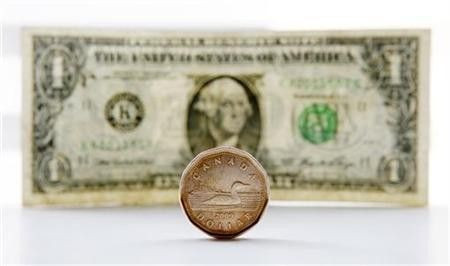Canadian dollar weakens as ECB leaves rates unchanged

The Canadian dollar weakened sharply against its U.S. counterpart in early trade on Thursday after the European Central Bank held interest rates unchanged, dashing hopes it might cut rates to stimulate growth.
Gold pared gains, government debt pared losses, and the euro and commodity-linked currencies like the Canadian dollar all slipped against the U.S. greenback as the ECB decision weighed on the risk environment, sending skittish investors back to the safety of U.S. Treasuries.
"The ECB is on hold, that disappointed the markets and suggests the ECB is more mindful of inflation than growth," said Jeremy Stretch, head of foreign exchange strategy at CIBC World Markets in London.
"I think obviously the key dimension will continue to be the broader risk dynamics and the backdrop for the U.S. dollar -- not the Canadian leg of the equation."
At 8:11 a.m., the Canadian dollar stood at C$1.0476 to the U.S. dollar, or 95.46 U.S. cents, near the session low and down from Wednesday's North American session close at C$1.0402 to the U.S. dollar, or 96.14 U.S. cents.
The Canadian currency had been virtually unchanged before the ECB decision was announced.
Stretch said he was skeptical the risk recovery that buoyed equity markets and the Canadian dollar on Wednesday was durable, suggesting the Canadian dollar would likely weaken through the day to test north of C$1.05 to the U.S. dollar, or 95.2 U.S. cents.
A Reuters poll released on Wednesday showed the Canadian dollar is expected to recover from 13-month lows to return to equal value with the U.S. dollar in six months' time, though projections are not as buoyant as they were before September's global meltdown.
Canada's dollar sank through parity with the U.S. greenback in September and has mostly declined since, as investors shift to the liquidity and security of the U.S. dollar as the European crisis and fears of a global slowdown persist.
Stretch said markets will keep an eye on the Ivey PMI, which measures purchasing activity in Canada, due out at 10 a.m. U.S. and Canadian employment data, due on Friday, will also be watched for signs of economic growth.
Bond prices were lower across the board on Thursday. The two-year Canadian government bond lost 2 Canadian cents to yield 0.915 percent, while the 10-year bond lost 17 Canadian cents to yield 2.158 percent.
© Copyright Thomson Reuters 2024. All rights reserved.





















